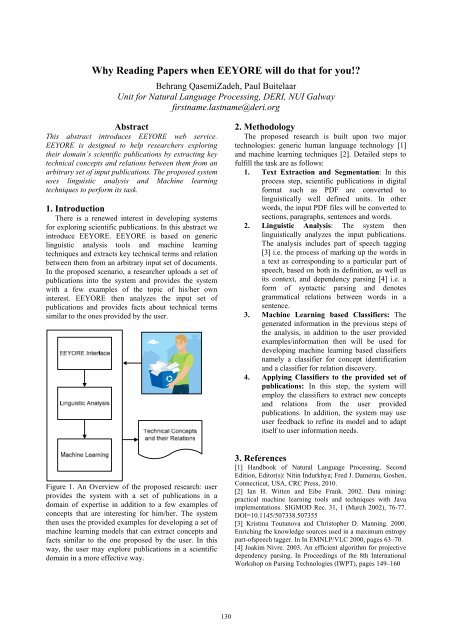NUI Galway – UL Alliance First Annual ENGINEERING AND - ARAN ...
NUI Galway – UL Alliance First Annual ENGINEERING AND - ARAN ...
NUI Galway – UL Alliance First Annual ENGINEERING AND - ARAN ...
You also want an ePaper? Increase the reach of your titles
YUMPU automatically turns print PDFs into web optimized ePapers that Google loves.
Why Reading Papers when EEYORE will do that for you!?<br />
Behrang QasemiZadeh, Paul Buitelaar<br />
Unit for Natural Language Processing, DERI, <strong>NUI</strong> <strong>Galway</strong><br />
firstname.lastname@deri.org<br />
Abstract<br />
This abstract introduces EEYORE web service.<br />
EEYORE is designed to help researchers exploring<br />
their domain’s scientific publications by extracting key<br />
technical concepts and relations between them from an<br />
arbitrary set of input publications. The proposed system<br />
uses linguistic analysis and Machine learning<br />
techniques to perform its task.<br />
1. Introduction<br />
There is a renewed interest in developing systems<br />
for exploring scientific publications. In this abstract we<br />
introduce EEYORE. EEYORE is based on generic<br />
linguistic analysis tools and machine learning<br />
techniques and extracts key technical terms and relation<br />
between them from an arbitrary input set of documents.<br />
In the proposed scenario, a researcher uploads a set of<br />
publications into the system and provides the system<br />
with a few examples of the topic of his/her own<br />
interest. EEYORE then analyzes the input set of<br />
publications and provides facts about technical terms<br />
similar to the ones provided by the user.<br />
Figure 1. An Overview of the proposed research: user<br />
provides the system with a set of publications in a<br />
domain of expertise in addition to a few examples of<br />
concepts that are interesting for him/her. The system<br />
then uses the provided examples for developing a set of<br />
machine learning models that can extract concepts and<br />
facts similar to the one proposed by the user. In this<br />
way, the user may explore publications in a scientific<br />
domain in a more effective way.<br />
130<br />
2. Methodology<br />
The proposed research is built upon two major<br />
technologies: generic human language technology [1]<br />
and machine learning techniques [2]. Detailed steps to<br />
fulfill the task are as follows:<br />
1. Text Extraction and Segmentation: In this<br />
process step, scientific publications in digital<br />
format such as PDF are converted to<br />
linguistically well defined units. In other<br />
words, the input PDF files will be converted to<br />
sections, paragraphs, sentences and words.<br />
2. Linguistic Analysis: The system then<br />
linguistically analyzes the input publications.<br />
The analysis includes part of speech tagging<br />
[3] i.e. the process of marking up the words in<br />
a text as corresponding to a particular part of<br />
speech, based on both its definition, as well as<br />
its context, and dependency parsing [4] i.e. a<br />
form of syntactic parsing and denotes<br />
grammatical relations between words in a<br />
sentence.<br />
3. Machine Learning based Classifiers: The<br />
generated information in the previous steps of<br />
the analysis, in addition to the user provided<br />
examples/information then will be used for<br />
developing machine learning based classifiers<br />
namely a classifier for concept identification<br />
and a classifier for relation discovery.<br />
4. Applying Classifiers to the provided set of<br />
publications: In this step, the system will<br />
employ the classifiers to extract new concepts<br />
and relations from the user provided<br />
publications. In addition, the system may use<br />
user feedback to refine its model and to adapt<br />
itself to user information needs.<br />
3. References<br />
[1] Handbook of Natural Language Processing, Second<br />
Edition, Editor(s): Nitin Indurkhya; Fred J. Damerau, Goshen,<br />
Connecticut, USA, CRC Press, 2010.<br />
[2] Ian H. Witten and Eibe Frank. 2002. Data mining:<br />
practical machine learning tools and techniques with Java<br />
implementations. SIGMOD Rec. 31, 1 (March 2002), 76-77.<br />
DOI=10.1145/507338.507355<br />
[3] Kristina Toutanova and Christopher D. Manning. 2000.<br />
Enriching the knowledge sources used in a maximum entropy<br />
part-ofspeech tagger. In In EMNLP/VLC 2000, pages 63<strong>–</strong>70.<br />
[4] Joakim Nivre. 2003. An efficient algorithm for projective<br />
dependency parsing. In Proceedings of the 8th International<br />
Workshop on Parsing Technologies (IWPT), pages 149<strong>–</strong>160
















